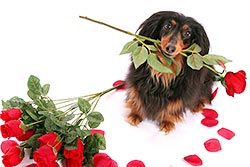
Weiner Shopping: Dachshund
Posted by admin on June 16, 2010
Currently ranking about 7th in breed popularity, the Dachshund is quickly becoming the most sought after urbanite. Turns out this playful, mischievous, and vertically challenged breed are ideal for apartment dwelling. With their shortened legs and low elongated body, the Dachshund will get a fair bit of exercise indoors. They do very well with limited play space, providing daily outdoor exercise is also available.
Bred over centuries in Germany, the Dachshund gradually developed into a great hunter of badger and other burrowing quarry. Indeed, the German words “Dachs + hund”, (pronounced daks′hōōnd) translates to ‘badger + dog’. The keen nose, elongated face, and great agility of this breed are ideal for trailing prey. Low to the ground, with strong muscular chest and limbs, these dogs were designed to access low, narrow dens and tunnels, in pursuit of prey. With amazing ability to remove itself from borrows, the Dachshund used its strong jaw and bite to haul out the vermin for their hunters.
A member of the hound group of dogs, the Dachshund has characteristic hound ears, making his drawn out face a further enhancement to the already comical stature, including long tail. This breed also has a hound-sized bark, so do not be mislead by its petite size or laughable disposition. About eight inches in height, adult standard Dachshunds weigh between 16 and 30 pounds, and come in three varieties: the smooth-haired, long-haired, and wire-haired. All three varieties come in both standard and miniature sizes. Miniature Dachshunds weigh in below 11 pounds, and stand just 6 inches tall.
Each variety of Dachshunds is said to have a temperament associated with its coat, due to cross-breeding origins. The smooth-haired variety has a coat that is shiny, straight, and short, which requires very little grooming, but could benefit from a sweater on a cold day. They tend to be apprehensive with strangers, and often isolate their loyalty to just one family member. The long-haired Dachshund is said to be the most even-tempered and friendly of all varieties, enjoying the attention of anyone willing to play a game. Their coats are long, silky soft, and slightly feathered, and require daily grooming to remove twigs and burrs, and to prevent matting. The double-coated, wire-haired Dachshunds are the extroverts, but tend to be more stubborn. A short, tight, wiry, harsh outer coat protects them from twigs and burrs. This, coupled with a softer, shorter undercoat, can keep this variety warm in cold weather. Their coat requires regular grooming and bi-annual trimming. Common colors include several shades of solid red, black/tan, or chocolate patterns, though all varieties are available in most colors, excluding white.
So, you’re convinced that a Dachshund is the puppy for you. You’ve just moved into your new condo, with plenty of parks and paths in the neighborhood. Now what? With so many breeders available, where should you begin? What sorts of questions should you arm yourself with, in preparation for selecting a potential breeder? Here are some basic questions, which should help get you started:
- Is the breeder a member of a breed club, and are only registered purebred dogs in good health bred?
- On inspection of the facilities where the dogs and puppies are kept, is it a safe, clean environment? Do the dogs appear healthy and happy? Are puppies for sale, born on the premises?
- Are the dogs kept in kennels out back, or are the dogs raised indoors as part of the family unit? Have the puppies and dogs been socialized? With children? With other animals?
- Can the breeder provide references of owners who’ve, previously purchased puppies from the facility?
- Is the breeder able to provide basic health records, including diet, vaccinations, and parasite control? What kind of food, (and quality), does the diet consist of?
- Is the breeder well versed in the genetic health problems associated with Dachshunds, and is he/she able to explain those concerns to you?
- Is he/she able to provide documented health testing clearances for several generations of the dogs being bred?
- Does the breeder rear more than a few different types of puppies? It’s pretty difficult for a breeder to be proficient in several breed standards.
- Will he/she be available to you in the future, as a resource for guidance or advice?
- Does the breeder insist that the puppies be at least 7 weeks old, before being placed in a home?
- Does he/she only breed dogs that are at least 2 years of age, when mentally and physically mature?
- Does the breeder sell or give puppies to dealers, brokers, wholesalers, or pet stores? All puppies should be sold to responsible purchasers, who have been screed for suitability as owners.
- Does the breeder insist the dog be returned to him/her, in the unlikely event that the purchaser is no longer able to care for the pet? Care and well being of the dog should be the life long concern and commitment of the breeder.
Thought not an exhaustive list, the above will be helpful in identifying a good breeder. Ask a lot of questions and furnish yourself with as much information as possible, about both the breed and the breeder. Speak to other Dachshund enthusiasts in your new neighborhood, and get recommendations. Before you know it, (after a lot of browsing, and perhaps waiting), you’ll be at the city dog park, proudly showing off your new purchase.


